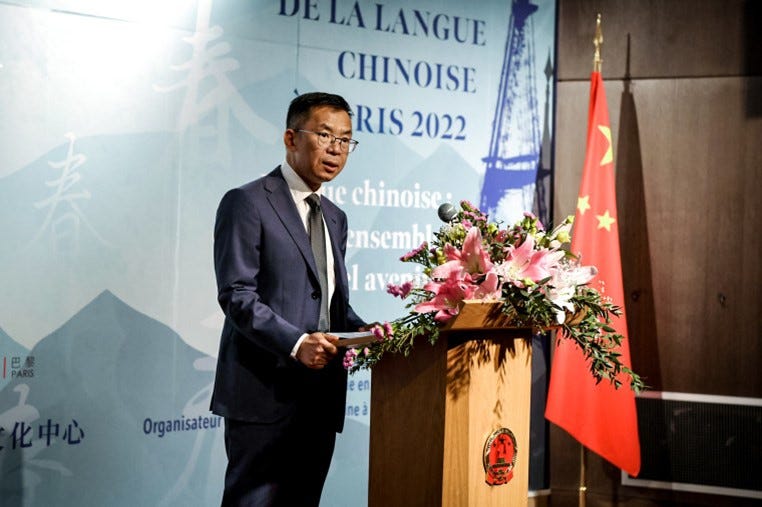‘Wolf Warriors’ Still on The Prowl
Beijing hastily backs away from envoy’s contention larger states still have the right to dictate to lesser neighbors.
China’s ambassador to France has kicked up a storm over remarks doubting the legitimacy of states which emerged from the break-up of the Soviet Union, saying they lacked “effective status under international law” and adding that the issue of Crimea was “not easy to answer”
China’s Foreign Ministry later backtracked, saying it “respects the sovereign status” of the former Soviet states and removing the ambassador’s remarks from its website. But it was too late to prevent the remarks from extinguishing some of the major diplomatic gains that Beijing thought it had made from President Emmanuel Macron’s April 9-12 visit, in which he infuriated many of his EU and other western partners by suggesting that they should follow a more neutral policy on China-US issues and that China could play a peacemaking role in the Russia-Ukraine conflict.
Macron’s words were in effect contradicted by EU Commission President Ursula von der Leyen but nonetheless showed an emerging split in EU ranks, just as Beijing had intended by dangling the bait of Airbus orders in front of Macron needing a diversion from his ongoing domestic problem of strikes and demonstrations against his changes in pension entitlements.
The ambassador may have chosen his words poorly but seemed to reflect an unstated Beijing position that the smaller neighbors of Russia were in effect still semi-satellites with limits to their independent action. His remarks infuriated countries such as the Baltic states, now EU members, which had emerged from Russian hegemony – Latvia, Lithuania, and Estonia – and caused ripples of concern in central Asia and the Caucasus. Immediately, they could be seen as a manifestation of Sino-Russian cooperation, which has even increased since the Ukraine invasion. Beijing’s claim to being a peacemaker was already hard enough to support given President Xi’s repeated praise for President Putin while failing to engage with Ukraine’s Volodymyr Zelenskyy.
Suggesting that Ukraine and the other satellite states had no formal post-Soviet legitimacy opened the way to all manner of territorial claims, not least Crimea. The ambassador singled out Crimea as having been part of Russia before being gifted to the then-Soviet republic of Ukraine in 1954 by then-Soviet leader Nikita Khrushchev, who was from the now-disputed Donbas region. But Crimea’s own Russian identity is recent too – the result of conquest from Turkey in the late 18th century and of Stalin’s ethnic cleansing of its Tartar (Turkic) population which had once been the majority but by then was only about 20 percent due to outward migration to Turkey and inward of Russians.
While a negotiated settlement of various post-Soviet ethnic boundary issues, including Crimea, Donbas, and other Russian majority areas would be desirable, any such deals would also require Russia to give up other territory and end its rule of the small states of the Caucasus where Russians are small minorities.
Behind Ambassador Lu’s remarks appear to lie deeper-rooted Chinese assumptions based on its own history (or a concocted version thereof) of treating smaller neighboring states as not merely uncivilized in varying degrees but naturally subservient to China. China thus fears local nationalism, not just the so-called “color revolutions” which toppled authoritarian regimes in former Communist countries and elsewhere in the recent past. It sees in the independence of the likes of Ukraine and even more so of smaller nations such as Georgia and Azerbaijan a reflection of its own past and possible future.
China today is bigger than it has ever been, thanks to the incorporation of Manchuria under the Qing dynasty and the imposition of Beijing rule and Han settlement in Xinjiang and Tibet since 1949. Yet the Tang dynasty 1,500 years ago once stretched just as far west as today’s borders with Kazakhstan and Kyrgyzstan, but with weaker central power, the boundaries of China’s empire contracted.
History has not come to an end just because China now appears to have an iron grip – assisted by an iron rail system – on Tibet and Turkestan (aka Xinjiang or New Territory). The Tibetan belief system lives on as does Uighur memory of the Uighur Khanate once defeated by the Tang dynasty but which flourished again as China’s empire ebbed.
Assumptions of the right to dictate to lesser neighbors which are or have been or should be within its empire are shared by Russia and China. In China’s case, this is displayed by its claim to the South China Sea, a claim which has no support in either history or geography, and also by repeated minor incidents which say more about attitude than policy. One such was also sparked by an ambassador – Beijing’s to Manila – appearing to threaten that Philippine military cooperation with the US endangered Philippine workers in Taiwan.
“Wolf warrior” diplomacy was supposed to have ended as China sought to present a softer image to the world after a period of over-emphasizing Beijing’s new power in the world. But “wolf warrior” is not so much a policy as a deeply ingrained assumption of Chinese size and cultural (and maybe ethnic) superiority. The ambassador’s words were in line with official thinking, if not of official policy.

